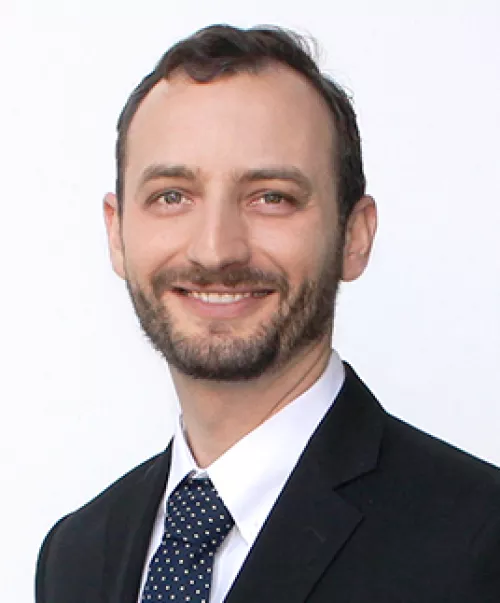This month, neurosurgeon Anthony DiGiorgio, DO, MHA joins the UCSF Department of Neurological Surgery and the Neurotrauma team at Zuckerberg San Francisco General Hospital (ZSFGH). Dr. DiGiorgio specializes in treatment of traumatic brain injury and spinal cord injury.
Dr. DiGiorgio, who grew up in the Bay Area, earned his medical degree at Touro University College of Osteopathic Medicine in Vallejo, California. He then completed neurosurgical residency at Louisiana State University (LSU), where he also received a Master’s degree in Healthcare Administration. Dr. DiGiorgio previously completed a Minimally Invasive and Complex Spine Research Fellowship and recently completed a Trauma and Critical Care Fellowship at UCSF, and will be continuing in the Department as an Assistant Professor.
The Path to Neurotrauma
“I covered a lot of trauma cases during my neurosurgical residency at LSU, which is where I really developed my love of neurotrauma. With my particular interest in spine, I was fortunate to come to UCSF during my research year to work on clinical spine research with Dr. Praveen Mummaneni. From there, I met Dr. Geoffrey Manley and was later accepted to the neurotrauma fellowship at UCSF and ZSFGH.”
“Research-wise, my passion is spinal cord injury (SCI). In the last year, I have been heavily involved in TRACK-SCI, a research initiative started by the UCSF Brain and Spinal Injury Center to promote collaborative basic, translational, and clinical research, and improve care for patients with SCI. We have a number of publications in the works, and recently have been expanding our multi-center, prospective, observational patient registry to additional sites, with over 170 SCI patients enrolled to date.”
Making Impact Through Healthcare Administration
“Working in New Orleans during residency, I covered a lot of the economically disadvantaged, indigent population there. Healthcare policy and administration are among my interests, because I feel that it relates to addressing health disparities. This was part of my motivation for pursuing a Master’s in Healthcare Administration.”
“Now at ZSFGH, I take a big interest in administration, helping with numerous initiatives for improving outreach to economically and socially disadvantaged communities. One quality improvement project is in creating an integrated spine service, for both elective and trauma spine care. Our goal is to bring all the specialties together to streamline how we reach primary care physicians and deliver spine care to the local population.”
The Future of Telehealth
“The COVID-19 pandemic has really changed the way we do virtual visits, and we have really been harnessing the power of telehealth. Now, patients can be at home for some follow-up appointments, and I think they appreciate that it saves them a trip to clinic. All the patients I have spoken with have responded really positively about it.”
“So now, we are looking at ways of using telehealth in the future to improve patient care and the overall patient experience. For example, one of our quality improvement project involves incorporating telehealth visits into follow-up care for TBI patients, which would reduce their hospital stay, when safe. It would save the patient time and make it easier for their families to have them at home – especially during COVID, when visitors to the hospital are limited.”
“Another option we are exploring involves setting up telehealth clinics as a screening clinic for spine conditions, including adult spinal deformity. Ideally, primary care providers would be able to take advantage of this telehealth option to facilitate referrals and ultimately expand access to the community.”

